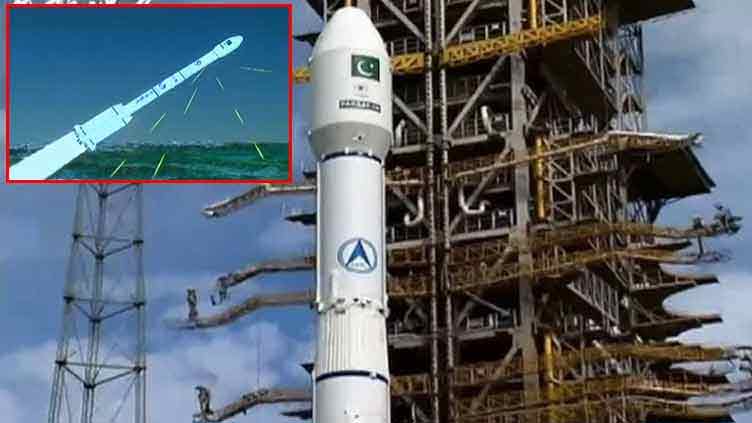Pakistan launches second satellite 'PakSat MM1' for fastest internet connectivity

Pakistan
This satellite will help provide connectivity to remote areas of the country
ISLAMABAD (Web Desk) - Pakistan launched its second communication satellite, PakSat MM1, into space on Thursday, hoping that it would help provide the fastest internet facility throughout the country.
The second satellite, which is equipped with advanced communication equipment was launched from Xichang Satellite Launch Center (XSLC), China.
This satellite project is a hallmark of technological cooperation between the People’s Republic of China and Pakistan and is expected to revolutionise communication in Pakistan and serve as a giant leap towards a digitally connected Pakistan.
Based on advanced communication technologies, PakSat MM1 will play a pivotal role in the socio-economic uplift of the country and will prove to be a stepping stone in the transformation of the country into Digital Pakistan.
Pakistan Space and Upper Atmosphere Research Commission (Suparco) carried out the launch through the support of China, in accordance with the National Space Program 2047.
The satellite is expected to contribute to the establishment of a sophisticated communication network and help meet the growing demands of the telecom sector and its advanced capabilities will address the increasing demand for high-speed internet and seamless connectivity.
PM Shehbaz Felicitates Nation
Prime Minister Shehbaz Sharif felicitated the entire nation on the launch of the second satellite. With its state-of-the-art communication technology, this satellite promises to revolutionize our digital landscape and provide the fastest internet facility throughout the country,” the prime minister said in a statement.
Congratulating the nation on the “momentous occasion” he said that the achievement marked a significant advancement in Pakistan’s space and communication capabilities, and he was proud of the national accomplishment.
The prime minister said that Paksat MM1 would not only enhance the lives of Pakistani citizens but also contribute to the promotion of economic activities, e-commerce, and e-governance.
PM Shehbaz said that the launch of Paksat MM1 from China’s Xichang Satellite Launch Centre was a testament to the strong collaboration and partnership between two countries. “It is through such cooperative endeavors that we can propel our nation forward and harness the power of technology for the benefit of our people.”
He said that the positioning of Paksat MM1 in a geostationary orbit 36,000 kilometers above earth was an impressive feat that showcased the nation’s scientific and technological prowess.
He lauded the dedication and hard work of the talented individuals at the Space and Upper Atmosphere Research Commission (Suparco) and all those involved in the mission.
Calling the collective efforts and determination the driving forces of Pakistan’s progress, the prime minister said the Paksat MM1 launch was a testament to the nation’s potential and the bright future that lies ahead. “May the launch of Paksat MM1 be the harbinger of even greater successes in our quest for excellence in space and communication technology,” he prayed.
What the SUPARCO Says
SUPARCO says “This high-power multi-mission satellite will provide communication services in C, Ku, Ka Bands and SBAS services in L Band. Based on advanced communication technologies, PakSat-MM1 will play a pivotal role in the socio-economic uplift of the country.
It will prove to be a stepping stone in the transformation of the country into Digital Pakistan. It will provide various communication services like broadband internet, TV broadcasting, Mobile bank –hauling and VSAT connectivity”.
Project Manager MM-1, SUPARCO, Usman Iftikhar, said that the primary objective behind the PAKSAT MM-1 satellite is to strengthen Pakistan’s communication infrastructure would pave the way for broadening the horizons for connectivity, serving the unserved, Tele-education, E-health/Tele-medicine, E-governance and E-commerce while transforming Pakistan into a digital powerhouse.
He said that communication infrastructure is the backbone of any country and plays an important role in the development of the country and this satellite will help provide connectivity to the remote areas of the country. This satellite is a communication satellite that will be sent in a Geostationary Orbit.
Earlier, Pakistan’s historic lunar mission (ICUBE-Q) was launched on May 3 on board China’s Chang’E6 from Hainan, China. The satellite iCube-Qamar mission marked Pakistan’s first lunar exploration effort which is a significant milestone for the country’s space endeavours.
The satellite iCube-Q was designed and developed by the Institute of Space Technology (IST) in collaboration with China’s Shanghai University SJTU and Pakistan’s national space agency SUPARCO.
The satellite, weighing about 7kg, was developed by the Electrical Engineering Department of the Institute of Space Technology (IST) in Islamabad. The satellite successfully captured and transmitted its inaugural images from lunar orbit, providing a unique perspective of the moon’s surface.
Regarding the benefits of satellites, Suparco said that satellites play a vital role in improving communication, enhancing navigation, monitoring the environment, advancing scientific knowledge, and supporting various aspects of daily life, making them indispensable for humanity’s progress and well-being.
Satellites are incredibly beneficial for humanity in communication, navigation, weather forecasting, earth observations, scientific research, disaster management, remote sensing, and telemedicine.
Three types of satellites are required for any country, firstly for communication, secondly for remote sensing and reconnaissance, and thirdly for navigation.


